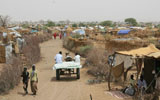
The troubled region of Darfur has seen a rise in violent conflict in recent months – exacerbating the dismal and unsustainable status quo that 3 million displaced Darfuris face – but the international community has proven preoccupied with the upcoming referendum in southern Sudan. The Sudanese government is taking full advantage of the inability of international actors to multitask and is beginning to implement a new strategy that will likely lead to further suffering among those who have survived the past seven years of conflict.
In a report released today by the Enough Project, my colleague Omer Ismail and I present an overview of the current situation in Darfur, based on interviews with sources on the ground in Darfur, neighboring Chad, and Khartoum. Our findings indicate that while there is no longer full-scale war in Darfur, as was seen in earlier years, the current situation in the region remains troublesome, and is likely to worsen if the international community doesn’t stop addressing one challenge in Sudan at the expense of the other.
"It is important for Sudan’s stability that we have a holistic approach to tackling the crisis in Darfur and the referendum in the South,” argued Enough Advisor Omer Ismail. “After the signing of the Comprehensive Peace Agreement, all engines were sent to extinguish the fire in Darfur thus leaving the South to its own devices. Now the unraveling of the CPA and the count down to the referendum have shifted attention completely from Darfur in favor of the South. We are repeating the same mistakes, and we are bound to end up with the same result."
Most recently, the international community expressed its support for the Sudanese government’s new Darfur strategy, even while sources on the ground claim that the intentions of Bashir and his cronies are clear. The strategy, which will ultimately involve camp closures, resettlement to ‘model villages,’ and a forfeiture of land rights, is a means by which the government can resolve its Darfur problem without angering the tribes that it armed years earlier, and to whom it promised benefits in exchange for involvement in massive human rights violations. While the government shows itself to be adept at utilizing the West’s lexicon of ‘voluntary returns’ and ‘development,’ one doesn’t have to look far to realize the extent of the façade. Recent government threats to close Kalma camp, for example, demonstrate the government’s willingness to do whatever it takes to ‘resolve’ the Darfur problem – as well as the international community’s willingness to look away.
The United States and its partners should refocus their attention on pursuing a political solution to the conflict in Darfur while concurrently engaging civil society at the grassroots level, and should take greater steps to both ensure the protection of civilians in the region and work towards justice and accountability. If the international community does not respond with a comprehensive and coordinated effort to not only make peace on paper but to implement viable security arrangements that effectively protect civilians and promote accountability – in essence, to learn from mistakes of the past – the future of Darfur will be bleak.
Click here to read the full report, “Neglecting Darfur.”
Photo: Kalma camp in Darfur (MSF)

